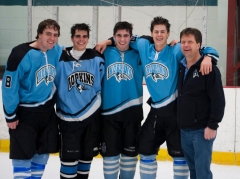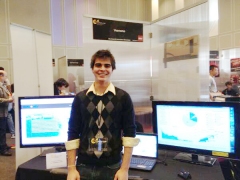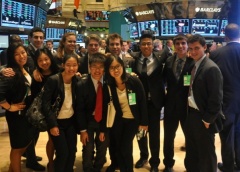I began thinking about what I wanted to do with my life and what type of career I wanted back in high school. Thanks to some pretty stellar and unique engineering internships, I decided I wanted to be an engineer, but wasn’t sure which kind. I was also interested in being a doctor so Biomedical Engineering seemed like a solid compromise.
Boom! In the blink of an eye I am picking out my classes for my first semester at The Johns Hopkins University. I selected Introduction to Business since the topic was of interest to me and the course would help me satisfy several graduation requirements. While at the time I thought this course would just be an interesting elective, it turned out to be a pivotal course for shaping my future career path.

Over the next two years, I would spend the summers and winter breaks working at a DOD lab back home as an engineer. However, through those internships and my BME coursework I learned I did not enjoy being an engineer. What should you do if this happens you?
1. Don’t freak out.
Biomedical engineering is by far the most interesting technological field right now. To date, I pride myself on keeping up to date with advances in both the “science” and the “techniques.” Yet, I had decided that I did not want to be an engineer and I had decided that being a doctor was also not in the cards. So I asked myself, “What have you done on this campus that you truly have enjoyed? Not just intellectually, but the actual process of completion?”
2. Go to “first meetings of the year.”
Go to as many first meetings as possible for any organization you might be interested in. While there is no way you can (or should) do them all, it’s a great way to find some niches of which you had been previously unaware. I had the great privilege of being a part of many groups on campus including (but not limited to) SGA, AKPsi, The Pre-Law Society, the Politik, Senior Leadership Consultants, and the club Ice-Hockey team.
3. Listen to yourself.
When I self-evaluated I realized my true day-to-day passion revolved around business. Mind you, this is not the most reassuring realization. Fortunately, there was some precedence for this type of thought. The solution for most Hopkins engineers is to go into some sort of consulting. Which makes sense; you can use a lot of the same equations and all of the same analytical skills. Instead of optimizing a cell pathway, you’re optimizing logistics for some big corporation.
4. Don’t rush a decision.
If you are already pivoting from what you are studying, make sure you pick the right pivot. A lot of my peers went on into consulting. Yet, personally, something didn’t “feel” right. Basically, I would be engineering for businesses, not actually doing business. “And what about the science?” I asked myself. Shouldn’t I stay involved somehow?
The semester before I was having this conversation with myself, I was taking an E&M course called “Managing Social Enterprises” which was all about how management styles differ between social and for-profit companies as well as startups vs established companies. It was from this class that I finally found my answer. I would love to join the Venture Capital/Startup world. This would allow me to practice business plus stay connected to the biomedical world. The question was–how?
5. Talk to everyone.
It is not so easy to be a BME/AMS double major and decide you want to go into VC. Most VCs have been to business school and/or worked for a successful startup. I had not. Fortunately, one night I happened to be in DC visiting some friends. While hanging at a local bar, I started talking to someone who knew a local VC and he put us in contact.
6. Internships!
You may or may not be paid, but such is the nature of internships in 2013. The most important thing is the experience the internships provide, not the paycheck, so be sure to take advantage of internships even if they are unpaid. During my senior spring I interned for Fortify Ventures, an early-stage tech VC firm located in DC. While I was what you would call a gopher, I learned quite a few valuable lessons. I was able to turn this internship into another internship, joining the investment team at the Center for Innovative Technology, an early-stage VC firm located in Herndon, VA. Fortunately for me, CIT invested in not only technology firms, but also green energy and biotech companies. So it was at CIT that I finally began evaluating companies, thus gaining some true VC experience while still only being an intern.
7. Leverage where you are to get one step closer.
Before I could be considered a viable candidate for full-time (non-intern) position at a VC firm, I needed to either go to business school, get my Ph.D., or join a successful startup. I chose the third option. While my true passion is biotech, I chose a tech company for a practical reason. Biotech startups take ten years to grow and tech startups take just two to three years.

Last October, a video-processing company called Veenome came and pitched CIT. Being on the investment team at CIT, I was able to get a clearer picture of Veenome than most of the other applicants and was thus able to land a job with Veenome. Here I am, six months later, truly enjoying work everyday and very well poised for the career I want. Yet, I often think about what would have happened if I had not listened to myself and had stayed an engineer.
– TJ Bozada








